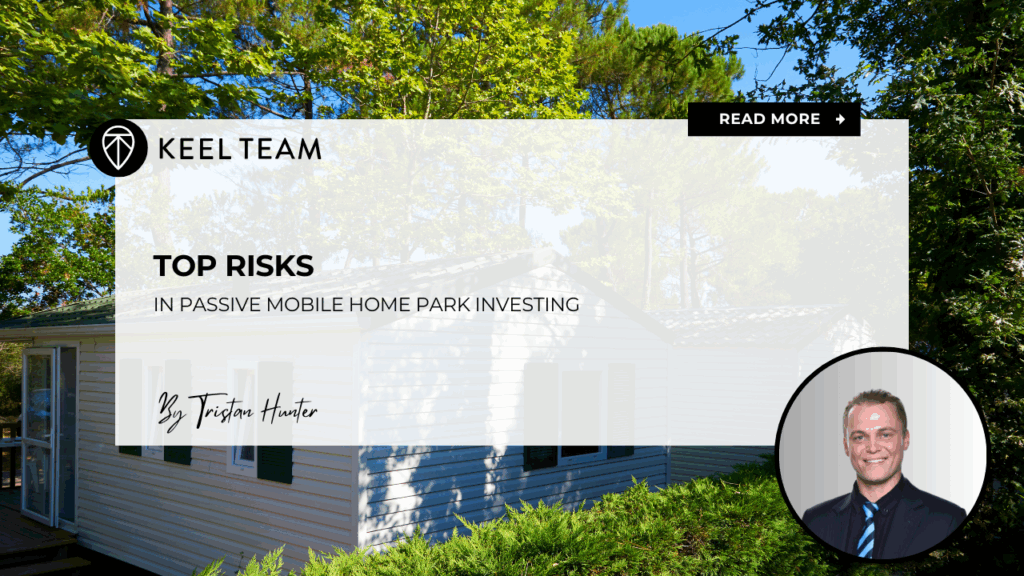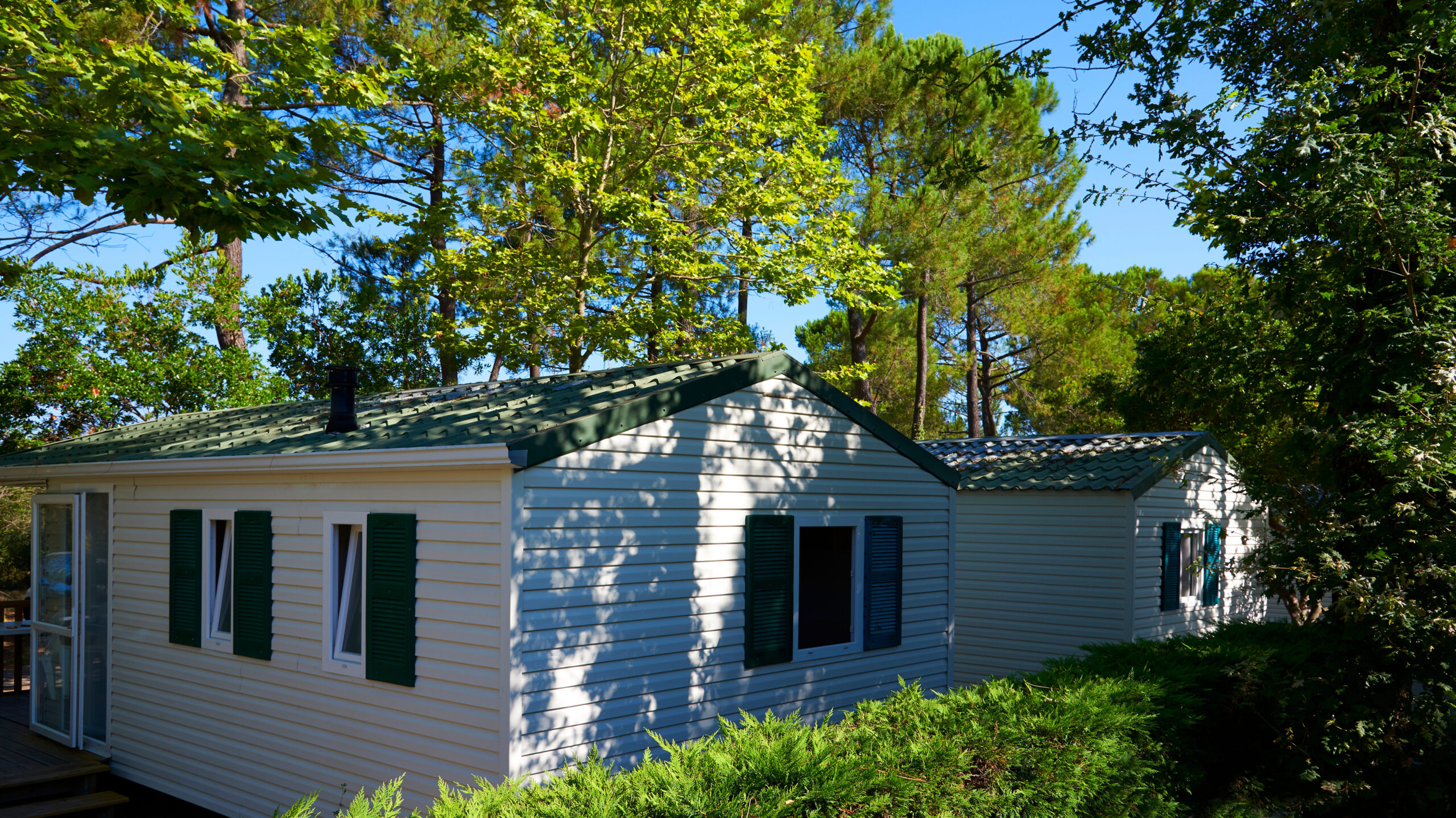Top Risks in Passive Mobile Home Park Investing
-
 Tristan Hunter - Investor Relations
Tristan Hunter - Investor Relations

Passive investing in real estate often draws interest from individuals seeking consistent returns without the responsibility of direct property management. Among the various real estate asset classes, passive mobile home park investing has gained attention due to its potential for stable cash flow and unique demand drivers. However, like all investments, mobile home park investing carries risks. Understanding these risks and the ways experienced operators attempt to mitigate them is essential for anyone considering this type of investment.
Below, we will explore the top risks in passive mobile home park investing, with a focus on realistic, non-definitive insights.
Risk of Capital Loss
Why It Matters
Every investment carries the possibility of losing capital, and mobile home park investing is no exception. Investors might contribute to a syndication or partnership with the expectation of long-term returns, but unforeseen circumstances such as market shifts, operational challenges, or natural disasters could erode value.
How It’s Mitigated
Capital preservation often begins with careful acquisition. Experienced operators tend to focus on mobile home parks that already demonstrate stable occupancy, solid infrastructure, and proven demand. Conservative underwriting, which includes stress-testing financial projections against possible downturns, helps reduce the likelihood of overpaying or overleveraging. Additionally, purchasing insurance and maintaining appropriate reserve funds may help mitigate potential losses from unexpected events.
Download our FREE eBook on the Top 10 things to know BEFORE investing PASSIVELY in mobile home parks!
Dependence on the Operator
Why It Matters
For passive investors, the operator is arguably the most important factor in mobile home park investing. Unlike direct property ownership, where an individual can intervene, passive investors place their trust entirely in the operator’s ability to manage, execute, and grow the investment. A poorly managed operator can make costly mistakes, fail to execute the business plan, or mismanage capital.
How It’s Mitigated
Investors often perform extensive due diligence on the operator before committing capital. This process may involve reviewing the operator’s track record, analyzing prior investments, speaking with past investors, and understanding their communication style. Operators with established systems, clear reporting practices, and proven management experience are generally more likely to execute effectively. By selecting the right operator, investors reduce the risk of mismanagement.
Market and Demand Risk
Why It Matters
Mobile home parks serve a specific segment of the housing market: individuals and families seeking affordable housing. While demand for affordable housing in the United States has historically been strong, shifts in demographics, local economies, or zoning laws can affect occupancy rates and rental growth.
How It’s Mitigated
Operators often conduct extensive market research prior to acquiring a mobile home park. This includes studying job growth in the area, population trends, and the availability of alternative housing. Because new mobile home parks are rarely built due to zoning restrictions, supply is limited, which can help support demand in many markets. Still, operators may focus on regions with diverse economic drivers rather than relying on a single industry or employer.
Financing and Interest Rate Risk
Why It Matters
Mobile home park investing often involves leverage. While debt can amplify returns, it also introduces risk, particularly if interest rates rise or refinancing becomes difficult. A property with too much debt or unfavorable loan terms could face financial stress, especially during periods of economic uncertainty.
How It’s Mitigated
Operators generally work to secure loans with favorable terms, such as fixed interest rates or long amortization periods. They may also limit leverage to conservative levels to provide more flexibility. Building strong relationships with lenders can also help secure financing in future refinancing scenarios. Maintaining healthy operating margins gives operators room to adapt if interest expenses rise.
Operational Risk
Why It Matters
Owning and operating a mobile home park involves much more than collecting rent. Infrastructure such as water lines, sewer systems, and roads require upkeep. Tenant relations, rule enforcement, and the management of park-owned homes can all pose challenges. Poor operational execution may quickly erode profitability.
How It’s Mitigated
Experienced operators often employ professional management teams and implement standardized systems for tenant screening, rent collection, and maintenance. Some operators avoid owning too many homes within the mobile home park, instead focusing on renting lots to resident-owned homes, which reduces maintenance responsibilities. Others invest in infrastructure improvements early in the ownership period to prevent larger problems later.
Regulatory and Legal Risk
Why It Matters
Local, state, and federal regulations can significantly affect mobile home park investing. For example, municipalities may impose rent control measures, restrict community rules, or require costly infrastructure upgrades. Legal disputes with tenants or local governments may also create challenges.
How It’s Mitigated
Operators often consult legal experts to ensure compliance with current regulations and to monitor potential changes. They may also engage with industry associations that advocate for mobile home park owners and investors. By staying proactive, operators can adapt to new rules rather than being caught off guard.

Liquidity Risk
Why It Matters
Real estate investments, including mobile home parks, are generally illiquid. Passive investors may not be able to sell their ownership stake quickly if they need access to capital. This can be a challenge for investors who value flexibility.
How It’s Mitigated
Investors can prepare for illiquidity by only committing capital they do not expect to need in the near term. Operators often outline clear timelines for investment horizons, such as five to seven years, to help investors plan accordingly. While secondary markets for private investments exist, they are not guaranteed, so understanding the commitment upfront is crucial.
Tenant Risk
Why It Matters
The stability of a mobile home park often depends on the reliability of its tenants. Late payments, high turnover, or non-compliance with community rules can impact revenue and operational efficiency. Additionally, because residents typically own their homes but rent the land, relocating is costly, which can create unique tenant dynamics.
How It’s Mitigated
Operators may implement strict tenant screening processes and enforce community standards consistently. Providing good communication and maintaining a safe, well-kept environment often encourages residents to stay long-term. In some cases, operators help tenants transition to homeownership within the community, which may increase stability.
Environmental and Natural Disaster Risk
Why It Matters
Mobile home parks can face risks from floods, storms, fires, or other natural disasters. Environmental issues such as contaminated water or aging septic systems can also pose health and financial risks.
How It’s Mitigated
Insurance is a common safeguard against natural disaster losses. Additionally, operators may conduct environmental studies before acquisition to identify potential issues. Investments in infrastructure improvements, such as upgrading drainage or utility systems, can further reduce exposure to environmental risks.
Reputation and Community Relations
Why It Matters
Mobile home park operators sometimes face negative stereotypes or community resistance. Poor reputation can make it difficult to attract tenants, secure financing, or work with local governments.
How It’s Mitigated
Operators who focus on improving the community often gain goodwill with residents and local stakeholders. This might involve upgrading infrastructure, maintaining common areas, and fostering open communication with residents. A reputation for ethical, responsible ownership can serve as a protective factor over the long term.
Final Thoughts
Passive mobile home park investing presents both opportunities and risks. While investors may be attracted to the potential for steady returns and strong demand for affordable housing, it is important to recognize the risks involved. Key considerations include the possibility of capital loss, the importance of selecting the right operator, and exposure to market, financing, operational, and regulatory risks.
Mitigation strategies often involve thorough due diligence, conservative underwriting, strong management practices, and proactive community engagement. By understanding both the challenges and the approaches operators use to address them, investors place themselves in a better position to make informed decisions.
Are you looking for MORE information? Book a 1-on-1 consultation with Andrew Keel to discuss:
- A mobile home park deal review
- Due diligence questions
- How to raise capital from investors
- Mistakes to avoid, and more!
Disclaimer:
The information provided is for informational purposes only and is not investment advice or a guarantee of any kind. We do not guarantee profitability. Make investment decisions based on your research and consult registered financial and legal professionals. We are not registered financial or legal professionals and do not provide personalized investment recommendations.

Tristan Hunter - Investor Relations
View The Previous or Next Post
Subscribe Below 👇





